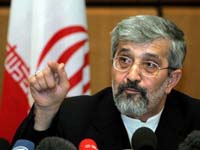Iran expects UN to stop involvement in its nuclear program - the sooner the better

After Iran answers all questions about its past atomic programs it expects the U.N. Security Council to close the file on its nuclear activities.
Ali Ashgar Soltanieh, Iran's chief delegate to the International Atomic Energy Agency, also accused Washington of "poisoning the atmosphere" of an IAEA probe into its past with its attempts to impose new U.S. Security Council sanctions.
As the Council's three permanent Western members, the U.S., France and Britain are at the forefront of a push for a third set of U.N. sanctions on Tehran for defying council demands to freeze uranium enrichment. However, Russia and China are opposed, leaving the likelihood of such measures unclear.
"There is no legal and technological justification" for continued Security Council involvement once the IAEA declares an end to its current probe, Soltanieh told reporters outside a Vienna meeting of the IAEA's 35-nation board. "Security Council involvement has to stop - the sooner the better."
That goes against recent U.S. statements. Earlier this month, chief U.S. delegate Gregory L. Schulte, responding to similar comment from Iranian President Mahmoud Ahmadinejad, said Tehran's file was "not closed" as long as any doubts remain about the nature of Tehran's nuclear activities and until Iran heeds council demands on enrichment.
Iran now is running 3,000 declared centrifuges - which is sufficient to produce enough fissile material for a weapon within 1Ѕ years, should Tehran go that route, and Soltanieh declared his country "the master of enrichment technology."
While noting some progress in clearing up past nuclear ambiguities, Schulte has labeled Iran's cooperation with the investigation inadequately "selective."
Inside the meeting, meanwhile, IAEA chief Mohamed ElBaradei told delegates that his agency knows less now about Iran's atomic activities than it did a year ago.
ElBaradei also said his agency is still in the dark about possible military applications of what Iran says is a purely civilian nuclear program. However, he praised Iran for providing long-sought answers about its nuclear past.
The two-day board meeting is focusing on a report from ElBaradei outlining the progress of his agency's nuclear probe. The report will also be crucial in expected U.N. Security Council deliberations.
The report, forwarded to the 35 nations last week, gives Tehran mixed marks. It suggests that, as far as the agency can determine, Iran has told the truth about its black market purchases of centrifuge technology used to enrich uranium.
But it points out that the IAEA will be unable to look at the present status of centrifuge development until the Islamic Republic restores fuller inspection rights to agency experts.
"The agency has not been able to verify some important aspects of Iran's nuclear program ... relevant to the scope and nature of Iran's enrichment activities as well as ... other activities that could have military applications," ElBaradei said.
While praising the increased level of cooperation shown by Iran in the past two months, he said his agency could not provide "credible assurance about the absence of undeclared nuclear material and activities."
And he said the IAEA's knowledge about Iran's current nuclear activities has "diminished" since Iran rescinded fuller inspection rights last year.
In Tehran, Iran's top nuclear negotiator warned Thursday that any threat against his country would affect the stability of the entire Middle East, in an allusion to U.S. suggestions that no option - including force as a last resort - is off the table in attempts to stop Iran's enrichment program.
"Playing with the security of Iran is like dominos," Saeed Jalili said. "We believe the world powers are aware about Iran's effective role in the global security. ... Our role in Afghanistan and Iraq is in direction with peace, stability and improving governments there."
But Iran's former chief nuclear negotiator sharply criticized Ahmadinejad, denouncing the prosecution of a former member of his negotiating team and accusing the hard-line leader of trying to eliminate rivals.
The comments by Hasan Rowhani, published Thursday, were the latest blow in the mounting rivalry between Ahmadinejad and former president Hashemi Rafsanjani, a powerful figure in Iran's clerical leadership.
In October, Rowhani delivered an unusually sharp rebuke to Ahmadinejad's policies, saying they are turning more countries against Iran and failing to fix the struggling economy.
Rowhani is a member of the Supreme National Security Council and sits on the Experts Assembly and the Expediency Council, another influential clerical body.
Subscribe to Pravda.Ru Telegram channel, Facebook, RSS!


